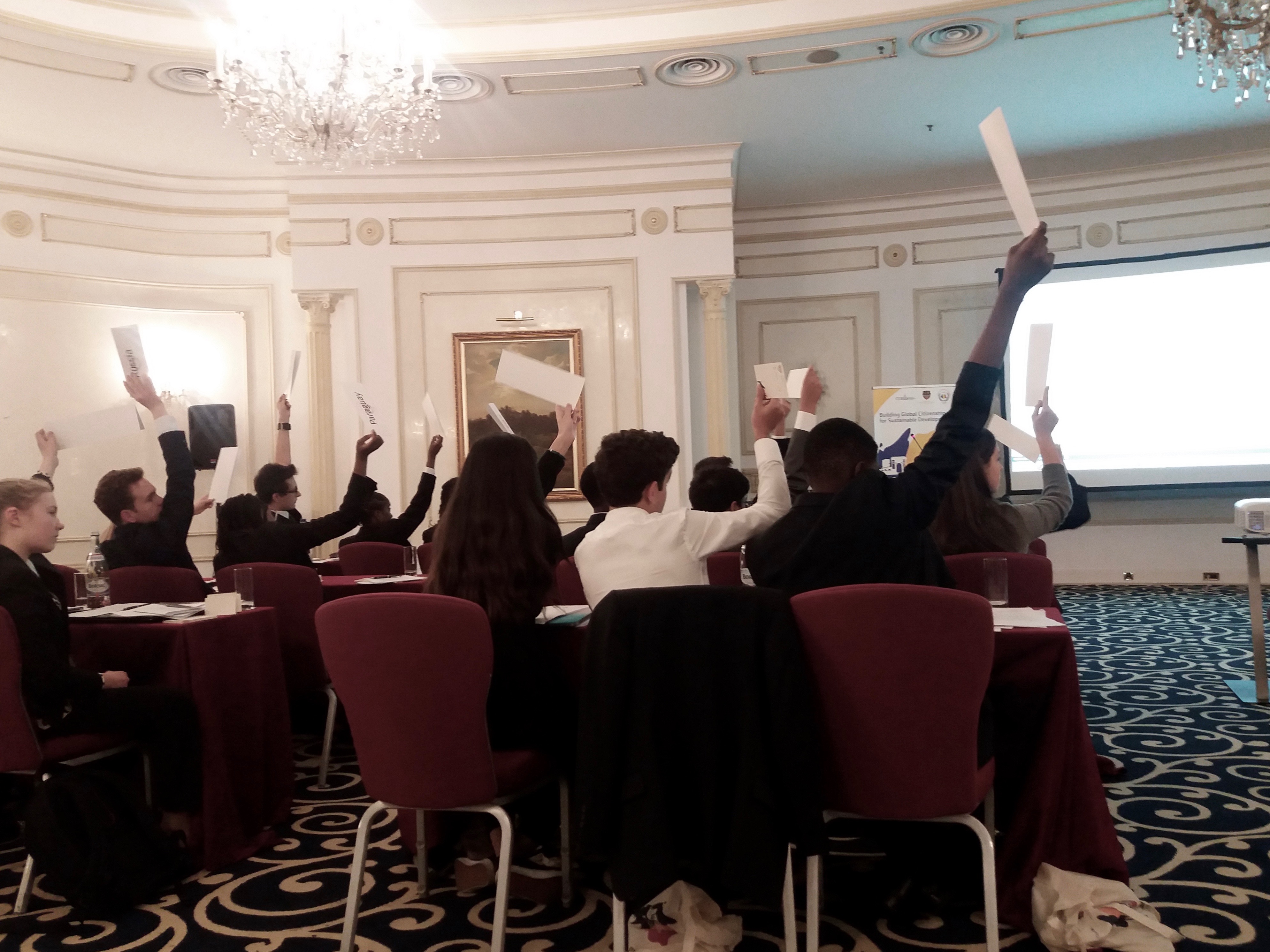
14 Mar COBIS-MUN 2016 – entrusting high schoolers with the power of taking decisions at global level
.
“I think any idea should be respected no matter the age of who it comes from. My voice has been disrespected what seems like hundreds of times.
I’ve been told by adults that I’m not ready to vote even if I keep up with politics and I’m sure of my beliefs.
I’ve been told to stop fighting for equality because I have a little voice and it won’t fix anything.
Now…the difference is that no one would say those things to an adult.
Any adult that fights for a cause like that would be deemed a courageous and dedicated hero, but because I’m 17, I’m naïve and ignorant. […] All teens are asked this: ‘What do you know? How could you know this? You’re only a teenager.’ We are asked this when we talk about politics, education, even with what we want to do with our lives, because we are ‘too young to understand’ and we don’t live in the ‘real world’.
This problem is bigger than it sounds. There is a constant belittling that occurs to student voices. Look at the education system: as students, we have no say in what we learn and how we learn it, yet we’re expected to absorb it all, take it all in, and be able to actually run the world someday.
[…]Students have ended up discrediting their own ideas because they started accepting the paradigm that their thoughts don’t come from an adult mind so they are not valuable. Kindergartners, when asked a question, are thrilled to be raising their hands, all of them. Yet, as you increase the grade level, fewer and fewer hands are raised each year. […] Yet, what really separates adults and teenagers intellectually? Is it an age? Do we wake up on our 21st birthdays with… everlasting knowledge? Do we turn 18 and suddenly have ideas that are worth listening to?
[…]It’s no secret that society has a lot of problems that we just can’t quite seem to solve. […] Maybe we’re not thinking about solutions creatively. Teens are criticised all the time for having rambunctiously inventive ideas, but maybe we should be harnessing these ideas, we should be tapping into these spontaneous pathways that their brains are able to produce at their age and using them to solve these problems.
[…] Ask us about social security, ask us about environmental destruction, ask us about…anything! Let us know that we matter… Once students know their voices matter the will feel obligated to participate, the will feel responsible to where policies are headed. It’s true that not all of us will understand these policies right away; just because we’re teenagers doesn’t mean that we don’t understand politics and similarly, just because you’re an adult doesn’t automatically mean that you do. […] Give us your respect, hold us accountable. I’m not asking for blind faith, I’m asking for you to let us prove it. […] We need to hold each other accountable for any progress to be made, and I promise you it will.
I’m 17. I haven’t won a Nobel Peace Prize, I haven’t solved inequality, I haven’t solved poverty, but the difference is that I know that I… can.”
These words come from a talk given by a teenager who was invited for a TEDx event, and her speech is called “I’m 17.” (https://www.youtube.com/watch?v=0OkOQhXhsIE) Why did I choose to transcribe excerpts from what she said? There are two reasons for this: firstly, this is a genuine, first-hand perspective upon the prejudices that one has about teenagers and that is valid at worldwide level and, secondly, I had the astounding opportunity to see how indeed teenagers can surprise any adult with the maturity with which they can approach current global issues that would normally be entrusted to ‘grown-ups’. I am referring to the context of Model United Nations, more precisely to COBIS MUN where Transylvania College was represented by four of our Year 11 students.
The event gathered students from 13 schools worldwide, challenging them to come up with resolutions for weighty topics that have stirred serious international debates, such as ISIS and terrorism, the Syrian refugees, death penalty or contemporary slavery… Would an ordinary teenager even be aware of the importance of such issues? Let alone think about potential solutions. Stereotypes. Paradigms. The answer is “yes”. I have seen them being more informed than any average adult, I have seen them surfacing concrete actions, with clauses and sub-clauses, I have seen them giving speeches in favour or against a motion, I have seen them asking relevant questions, I have seen them in smaller groups in front of a flipchart and with markers in their hands brainstorming ideas; briefly, I have seen 14 to 17 year olds talking about… the world’s future, as simple as that, in ways that would make any parent, teacher, diplomat and a whole country proud.
It is therefore of utmost importance for teenagers to be exposed to contexts in which they are offered the medium to exert their creativity, their energy and their need for a purpose. Structures such as Model United Nations are wonderful occasions for teenagers to prove the world that they have a voice and to prove and remind themselves as well that their age does not automatically and safely confine them to ignorance – and it is neither an excuse for it – until they reach the “maturity” threshold when turning 18.
So here comes a question for adults: “How will you choose to look at the first teenager you see?” As for teenagers, here is a question for you as well: “How will you choose to see yourself when looking in the mirror?”





No Comments